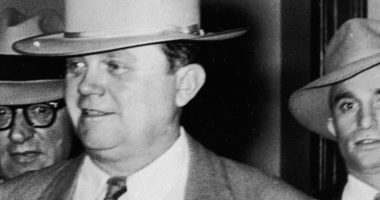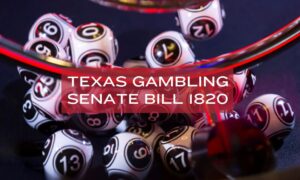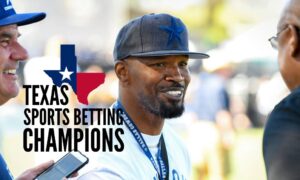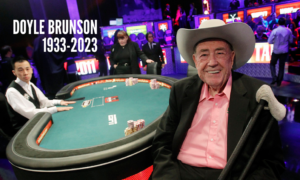
Texas, home to some of the most restrictive gambling laws in the country, has an equally storied history of gambling.
The names and places that define this history echo in the minds and memories of lifelong Texans. And in some cases, reverberate beyond the borders of the Lone Star State.
In this series, we’ll be looking into a few of the people, places, and moments that have defined Texas’s gaming history.
We hope to give you a better understanding of the state’s conflicted relationship with gambling, online casinos in Texas, and the culture they create.
The game rooms of Benny Binion in Dallas, TX
Lester Ben “Benny” Binion, son of a North-Texas horse trader, became as synonymous with the city of Dallas in the early-20th century as any city leader or ranching magnate.
Binion was a chubby man who wore the same model Stetson as LBJ and carried a newspaper under his arm. Although, the newspaper was not for reading — he was professedly illiterate and uneducated — but for concealing a pistol on a restaurant table.
Binion effected a warm and happy demeanor when in the confines of his Southland Hotel at 1200 Main St, Dallas. However, when challenged, he could be as violent as any mobster.
The Southland Syndicate, what his empire of hotels and game rooms came to be called, rose to prominence due to several events; both fortuitous and violent, for both Binion and Dallas.
Oil discovery pulls Dallas out of the Great Depression
The Great Depression spelled disaster for most of the country, Texas included.
But, due to the gambles of people like Columbus Marion “Dad” Joiner, a 70-year-old oil speculator, Dallas pulled itself from poverty into affluence over the success of a single oil well.
Joiner’s Daisy Bradford #3 became the first major discovery well in the East-Texas field. At the time, it was the largest oil region in the world. That well and the many that oilmen drilled around it, brought Dallas to life. And it secured an economy for the likes of Binion and the gambling men that preceded him.
The rise of Warren Diamond
Most prominent among those gambling predecessors and mentors was Warren Diamond, born in Dallas to Irish immigrants. He was, by the accounts of those present at the time, a mathematical genius who controlled 22 casinos in Downtown Dallas during the Roaring Twenties.
Diamond’s casinos principally offered a posh French dice game called craps, and they were notable for hosting the only no-limit craps games in the Northern Hemisphere.
Binion worked under Diamond, taking on menial odd jobs. But he rose in the ranks to become one of Diamond’s most trusted advisors and strongmen. When Diamond committed suicide in 1932, it was Binion who inherited his territories and who consolidated his control over the gambling business in Dallas.
Prohibition
Prohibition had a peculiar effect on Texans in that it retroactively made criminals out of people that had previously embodied the Spirit of the West: individualistic, full of initiative, grit, and resourcefulness.
No longer were small-time poker games and shootouts in the street an acceptable way to do business. No longer could alcohol and prostitution be considered therapeutic treatments for the hardscrabble life most faced.
Prohibition firmly attached the word “vice” to many practices commonplace during the early 20th century. I state this not to opine about the virtues of those days or to judge morals, but to express that many of the people who became outlaws had not intended to be outlaws.
Despite the moral overhaul constructed by Prohibition, many Texas cities, Dallas included, didn’t have a taste for enforcing the new laws with much zeal. As such, Benny Binion turned a lucrative numbers racket and casino syndicate into the biggest gambling empire west of the Mississippi.
Learning from Warren Diamond before him, Binion also provided “protection” for other gambling men and their gambling halls in the city. The fee for this service was usually 25% of the game’s total rake.
This arrangement made Binion very wealthy into the 1930s, but eventually, competition from other gambling houses forced the issue. And Binion found himself in the middle of some violent skirmishes that wouldn’t be out of place in a Spy vs. Spy comic or a Wile E. Coyote cartoon.
Herbert “The Cat” Noble
Herbert “The Cat” Noble took on the role of Binion’s nemesis after Binion killed Noble’s employer, Sam Murray. Murray was a rival gambler who had moved in on Benny’s territory.
What transpired thereafter was Noble’s rise to prominence at a venue called the Airmen’s Club. Binion felt that Noble’s success warranted more than the usual 25% cut of the total rake, and he raised the cost on Noble to 40%.
Noble refused to pay, Binion became irate and thus began a series of violent altercations that left Noble evading eight attempts on his life. This included high-speed car chases down back roads with guns blazing and car bombings which led inadvertently to the death of Noble’s wife.
And even an instance of Binion’s henchmen firing into the fourth-story hospital window where Noble was recovering from gunshot wounds; inflicted, most likely, by the same people shooting into the window.
Noble himself had a mind to assassinate Binion, who had by that time left Dallas to open the lavish Binion’s Horseshoe in Las Vegas.
Noble, an amateur pilot, planned to fly to Vegas from Dallas, pass over Binion’s house and drop lit dynamite on it. He was dissuaded by a law officer friend, and in the end, Binion got the best of Noble.
The ninth attempt on Noble’s life — a bomb planted in his mailbox — proved the fatal one. The Cat was finally out of lives.
When Binion heard of Noble’s death, all he had to say was:
“I’m glad he’s dead.”
Binion’s legacy
Binion’s rap sheet included everything from tire theft to murder. But he never served more than a few years for tax evasion.
He was able to operate at a time in Dallas when laws and morals took a backseat to development and ambition.
However, the end of World War II changed the moral landscape of the country. And the illiterate Binion could read the writing on the wall.
He left Dallas for Las Vegas where he went on to found the World Series of Poker and bring to the world’s attention some of the greatest poker players of that time, most of whom were Texan.
Is his a Texas story?
Were his gambles any different than those of the oil wildcatters or homesteaders that saw cities like Dallas and Fort Worth rise out of the dirt?
Was he Dallas’s Al Capone?
And, if so, does that make him more or less beloved?
These are all questions tied up in Texas’s history with gambling. And we’ll continue to explore them in the coming weeks.







